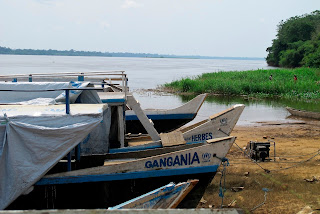Learning to do field research, and finally trying to apply
the lessons imparted in every book on research methods I could find, and every
seminar and class I have ever taken, does not go as planned. The main reason
why this is so…is me. This is not news to anyone who has ever tried to do this
before, I know.
Reading back over my field notes from my time in Impfondo, I
came across this list I wrote to myself:
Things to be aware
of
Nobody will think to tell you anything you need to know ahead
of time.
Everything starts late.
Nothing will be clear until it happens.
Even then, it won’t be clear.
You are not the most important thing going on in this place.
The last item on the list is, I think, the important one. On
one level, it is what distinguishes a researcher from a tourist. It may also be
the characteristic that makes the researcher resemble a missionary – a
connection that surprised me, since I am the opposite of religious and
typically think of myself as a very different sort of person. It turns out that
in many ways I am not.
During my time in Impfondo, I had the chance to meet an
extraordinary group of people, missionary doctors and their families at the
Hopital Evangelique le Pionnier. This hospital sits at the very edge of
Impfondo; turn to the left when leaving the gate and you return to town. Turn
right and you are on the road out into the jungle. This community of
expatriates provided me with the opportunity to learn more about the process of
learning to live and work in Congo, and the strategies that other outsiders
have used to adapt. They also gave me access to a reliable internet connection,
a chance to share meals, and some great conversation – all things I was feeling
in need of at the time.
Gradually, I also came to recognize that we all shared
something in common. Not religious faith, since as noted above I am not
religious. But missionaries and researchers feel a calling to explore, to
teach, and to create change that compels them to act. Throughout history, that
impulse has had both good and bad effects. The world’s hardest-to-reach, most
underserved populations are touched by the compassion and work of missionaries.
Sometimes lives are changed for the better by the results of research, too. Missionaries
have also worked hand in hand with colonizers and imperialists, as have
researchers of all kinds. The zeal that drives a mission – whether for
religious conversion or for scientific discovery – can sometimes go awry.
Doing this work, in full knowledge of its complex and often
problematic history, means facing the possibility that I could mess up, do the
wrong thing, or fail to achieve anything at all. It also means confronting some
of my own biases (against religion), and cultivating a bit more nuance in my
own understanding of religiously motivated people and their work. I look
forward to this part of the process, since it also means I get to know some
amazing people doing meaningful and extraordinary work.
If you would like to learn more about some of this work,
check out New Sight Congo, a non-profit group setting up an eye surgical center
in Impfondo.








